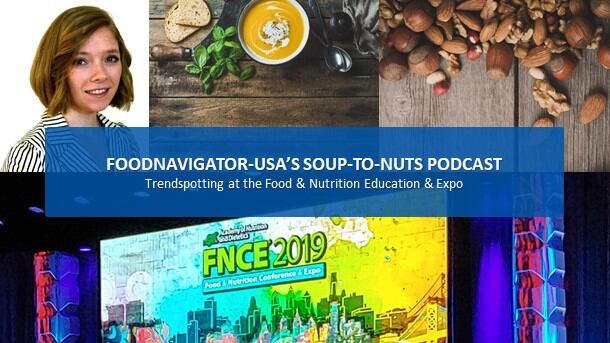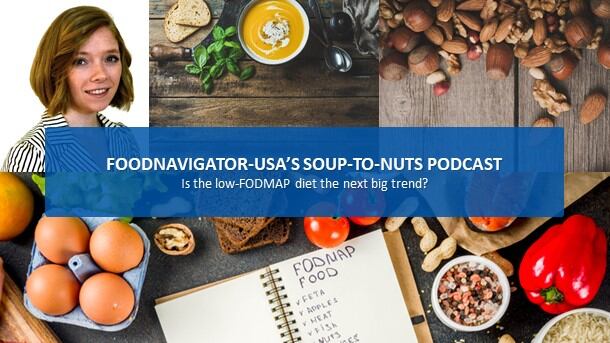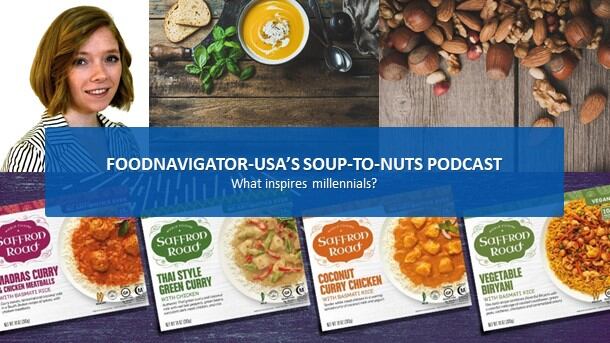Attendees crowded into hundreds of workshops to learn about everything from cultivating sustainable food systems to how diets and nutrients impact specific diseases to the development of the US dietary guidelines. They also had a chance to talk one-on-one with more than 330 exhibitors, including well-known companies such as General Mills, Danone and PepsiCo, as well as representatives for broad segments such as chicken, pork, blueberries and dairy, about how their products can be part of a healthy American diet.
While a broad range of interests were promoted at the show, a few major themes emerged at the conference that we take a closer look at in this week’s episode of FoodNavigator-USA’s Soup-To-Nuts podcast. These include the expansion of personalized nutrition beyond a supplement industry dominated segment, major diet trends coming to a crossroads, the ever-expanding selection of plant-based alternatives to dairy milk, and a strategies to help return the joy of eating to Americans suffering from food allergies.
[Editor’s note: Never miss an episode of FoodNavigator-USA’s Soup-To-Nuts Podcast by subscribing on iTunes!]
Personalized nutrition moves beyond supplements
Most dietitians and healthcare experts agree that there is no one-size fits all approach to fighting diet-related chronic diseases, and with epigenetic research showing that genetic expression is shaped by behavior as well as the democratization of medical testing it is now easier than ever to craft sophisticated personalized nutrition recommendations.
On the mass market, many of the first companies to move in this space focused on supplements, which allowed them to more easily measure specific doses of key nutrients and track their impact on the body. But as the space and technology evolve, more players are opening the door for food manufacturers to participate more directly in the segment.
Among those extending an invitation to food manufactures is Baze – an ‘evidence-based personalized supplement service’ that business development associate Gabrielle McGrath explained is looking to include high-quality foods or recommendations for products in upcoming subscription boxes.
“What I am really excited about is we are potentially creating something called the Baze Marketplace where once we look at our customers blood nutrient status and see where they are deficient we not only are going to be offering supplements, but we also are going to be recommending more food products,” she said.
As the company irons out the details it is looking for potential partnerships with CPG brands that meet its high standards, she added.
High-profile diets come to a crossroads
As the idea of personalized nutrition continues to filter out through mainstream America and the marketplace, different players are starting to incorporate it, including the well-known Atkins brand, which supports a low-carb diet with a broad range of comfort and convenience foods that are tailored to fit the lifestyle it promotes.
Atkins VP of Nutrition Colette Heimowitz explains that the brand offers three low-carb diet plans – either Atkins 20, Atkins 40 or Atkins 100, for which the numbers represent how many net carb grams followers can consume a day. This gives people flexibility based on their weight loss goals, current weight and lifestyle goals.
“I truly believe in personalized nutrition. There is something for everybody with Atkins and there is what I am hoping to be able to offer the tools to be able to control carbohydrates in a manner that suits your lifestyle, your likes, your metabolism,” she said.
At the same time she is skeptical of the emerging intuitive eating diet that suggests if people eat what they want when they want it they will be healthy. While this sounds logical, she explains that it only works if people already are on a healthy path and have the tools they need to recognize the difference between a candy craving and need to balance blood sugar.
New solutions for allergy-sufferers
A less flashy diet that is gaining traction that had a strong presence at FNCE and which we discussed in last-week’s podcast was the Low-FODMAP diet. As noted in that episode, the low-FODMAP diet is an acronym that stands for fermentable, oligo-, di- and mono-saccharides and polyols and it is a strict elimination diet that can be extremely difficult to follow.
While a handful of CPG companies, like FODY Foods, are making low-FODMAP versions of pantry staples, the startup Epicured is taking it one step farther and delivering fresh, ready-to-eat or heat-and-eat low-FODMAP meals direct to subscribers’ doors, as the company’s VP of sales and marketing Jamie Haak explained.
“Epidcured is 100% elimination phase-safe low-FODMAP and gluten-free fresh prepared meals …that are medically tailored to meet the research criteria to be low FODMAP and gluten free,” while also tasting delicious with recipes from award-winning chefs, she said.
The company currently ships from New York City to DC but is fundraising to expand to ship to the entire nation by the end of the year.
Easy solutions for allergy-suffers don’t always need to be as elaborate as what Epicured offers, as illustrated by new ready-to-eat snacks showcased at FNCE by SunButter. According to Nadine Doetterl, the iconic nut-butter alternative made from sunflower seeds sees a big demand for allergy-friendly snacks, especially at the school level.
“We find the allergy space really starts at the school level and so many parents now come to us and say, ‘Oh my gosh, yeah I know SunButter because my child goes to a nut free quote unquote school,” she said. But, she added, many parents continue to eat SunButter after their children leave the nest because they like the taste.
To help meet those cravings on-the-go, the brand is launching a SunButter cup paired with gluten-free bagel chips in a secure container on top. It also is bringing back its individual pouches so that consumers can enjoy a serving of SunButter how they want, when they want.
While SunButter is well known as an allergy-friendly option, Doetterl noted that the brand is repositioning itself to appeal to a larger demographic by tapping into the ongoing plant-based protein trend.
“SunButter has always been seen as the allergen alternative because we are totally free from the top eight allergens, and all of a sudden we all realized wait, the whole plant-based protein thing, that is us!,” she said.
Beyond protein, the brand also is promoting the micronutrients and high quality fats in the product.
Plant-based milks continue to expand
Another big trend at the show that has been gaining momentum in recent years is an increasingly broad selection of plant-based alternatives to dairy milk. The segment long-ago blew past just rice, soy and almond – although those remain popular – to include all kinds of nuts and seeds.
At FNCE, Three Trees showcased a line-up of four nutmilks that company teammate Aubrey Lim explained standout from the competition for their unique flavors, which include first-of-their kind Black Sesame Milk and Pistachiomilk.
The company’s products also standout from the competition for their back-to-basics production techniques and clean labels, which counter common complaints about plant-based dairy alternatives, such as the ingredient decks are long and tend to include difficult to pronounce words and that the nutritionals don’t stack up to traditional dairy.
Lim acknowledged that plant-based milks won’t likely match up to dairy milk nutritionally without fortification, but there are steps that Three Trees takes to boost the nutritional value of their products, such as including the complete nut so that no fiber is lost and the protein and calcium levels are higher than many other almond milks.
Watch for move coverage from FNCE in upcoming newsletters from FoodNavigator-USA.




